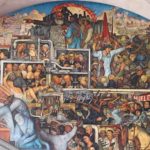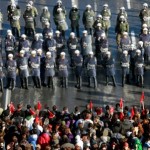
Against Agamben: Is a Democratic Biopolitics Possible?
It is legitimate to ask whether a democratic or even communist biopolitics is possible.
Tags: Agamben, biopolics, Coronavirus, Covid-19, pandemic, public health

It is legitimate to ask whether a democratic or even communist biopolitics is possible.
Tags: Agamben, biopolics, Coronavirus, Covid-19, pandemic, public health

Nicos Poulantzas offered invaluable insights into the complexity of state apparatuses, articulating multiple relations between the state and the terrain of class struggle including the realm of production, and the myriad ways that the state functions as a crucial node in the (re)production of bourgeois class strategies.

European Integration is a process traversed by class antagonisms, and particular class relations of force can explain both its history and its particular institutional configuration. Yet its particular economic, institutional, and monetary architectures represent material obstacles to the actual coordination of the struggles of the subaltern classes all over Europe, struggles that are necessarily uneven because of the different temporalities of social antagonism in different social formations. This what makes a strategy of rupture and exit the necessary condition for social change but also for the possibility of creating new forms of coordination and cooperation between movements.

The deep social and political crisis in Greece, as a “cathartic” moment, also offers the possibility for a different social and political road away from neoliberalism and debt-driven consumerism.

We asked several contributors to write on the theme of the state and revolutionary strategy, for a roundtable discussion revolving around the following prompt: “In the late 19th and early 20th centuries the socialist movement spilled a great deal of ink debating the question of state power. Lenin’s work was perhaps the most influential, but it also provoked a wide… Read more →